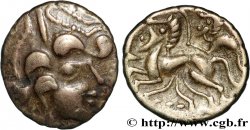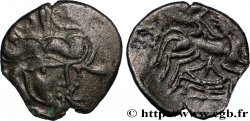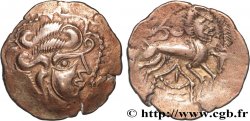bga_325315 - GALLIA - ARMORICA -OSISMII (Area of Carhaix - Finistère) “Petit billon” armoricain, au cheval
无库存.
所有在网站上销售的产品 (2014)
价格 : 350.00 €
所有在网站上销售的产品 (2014)
价格 : 350.00 €
种类 “Petit billon” armoricain, au cheval
日期: c. 80-50 AC.
铸币厂名称/城市 Brest (29)
材质 billon
直径 11,5 mm
模子方针 11 h.
重量 0,53 g.
稀少度 INÉDIT
关于品相的说明
Monnaie sur un flan court mais avec des types centrés et presque complet. Belle patine gris foncé
出版目录中的项代码 :
家谱
Ce billon provient de la collection P. Gendre et est indiqué provenir de Vendeuil-Caply (60)
正面
正面的文字 ANÉPIGRAPHE.
正面的说明书 Tête humaine à gauche, le nez retroussé est une sorte d’esse devant le visage.
背面
背面的文字 ANÉPIGRAPHE.
背面的说明书 Cheval à gauche, la crinière du cheval bouletée ; un motif indéterminé au-dessus de la croupe et entre les jambes.
评论
Cette monnaie semble devoir être rattachée à un ensemble mal connu de petites monnaies de bas aloi, souvent dites "petits billons armoricains". Ce type précis ne correspond à aucunes des monnaies conservées au musée de Rennes ou encore publiées dans le Nouvel Atlas.
Des similitudes peuvent être trouvées avec la série de rares petits billons mise au jour sur le site de Trogouzel (Finistère).
This coin seems to be part of a little-known set of small, low-alloy coins, often called \\\"small Armorican billons.\\\" This specific type does not correspond to any of the coins preserved in the Rennes museum or published in the New Atlas. Similarities can be found with the series of rare small billons unearthed at the Trogouzel site (Finistère).
Des similitudes peuvent être trouvées avec la série de rares petits billons mise au jour sur le site de Trogouzel (Finistère).
This coin seems to be part of a little-known set of small, low-alloy coins, often called \\\"small Armorican billons.\\\" This specific type does not correspond to any of the coins preserved in the Rennes museum or published in the New Atlas. Similarities can be found with the series of rare small billons unearthed at the Trogouzel site (Finistère).








 对产品描述纠错
对产品描述纠错 打印
打印 分享我的选择
分享我的选择 提问
提问 Consign / sell
Consign / sell
 产品介绍
产品介绍










